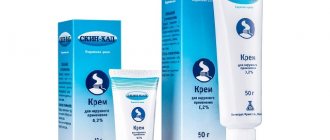An adult should consume at least 10-11 mg of zinc every day. But when taken with food, no more than 40% of this microelement is absorbed. Therefore, in some cases, additional use of drugs containing zinc, for example, Zincorol, is required. This is an effective remedy that can be purchased at an affordable price in pharmacy chains without a doctor's prescription.
Composition, properties, release form
“Zincite” is a small effervescent tablet, each of which weighs 4.5 g. The main active ingredient is zinc sulfate (44 mg). This amount is equal to 10 mg of pure zinc. Various sodium compounds (saccharinate, bicarbonate, cyclamate) are added as additional components. For aroma and taste, passion fruit particles and citric acid were added to the tablet.
Zinc is extremely important in the functioning of a living organism. It performs many functions:
- participates in protein synthesis and metabolism;
- stimulates cell growth and division;
- promotes skin renewal and restoration;
- participates in bone formation (along with calcium);
- accelerates the synthesis of keratin and collagen;
- provides perception of tastes and smells;
- helps heal wounds;
- participates in the formation of vitamin E;
- affects the growth process of nails and hair;
- controls the functioning of the sebaceous glands;
- affects the production of insulin and sex hormones.
This element is often called the “beauty mineral” because it affects the condition of hair, skin and nails.
Zinc deficiency seriously undermines health. Unpleasant symptoms occur:
- anxiety, irritability, nervousness;
- fatigue;
- impaired sense of smell and taste;
- peeling and dry skin;
- hair loss;
- the occurrence of dandruff;
- splitting and brittleness of nails;
- poor appetite;
- long healing of scratches and wounds.
This condition is called hypozincemia. To restore normal zinc levels, you will need special medications, which include Zincit. One tablet will provide the body with 66% of the daily requirement of zinc. There are 20 tablets in a package. It is important to remember that this is an additional source of microelements, and the main one should be the correct diet.
Pharmacological properties of the drug Zincteral
zinc is a trace element that is part of enzymes involved in various biochemical reactions and processes of hormone synthesis in the human body (zinc-dependent hormones are insulin, corticotropin, somatropin, gonadotropin); plays an important role in protein synthesis, carbohydrate metabolism, affects the growth and development of body cells, the functioning of the nervous system, the functioning of the immune system, maintaining normal levels of vitamin A in the blood, necessary for the normal course of pregnancy. The total amount of zinc in the adult human body is 1.4–2.3 g (21.4–35.1 mmol), of which 98% is intracellular zinc. The daily requirement for elemental zinc in adults and children aged 10–15 years is about 15 mg Zn2+; in young children - 5–10 mg Zn2+; during pregnancy and lactation - 15–19 mg Zn2+. Zinc sulfate, which is part of the drug, does not irritate the mucous membrane of the esophagus and stomach, since the protective shell of the Zincteral tablet ensures the release of the drug directly in the duodenum. Absorption of zinc occurs in the duodenum and small intestine. Its bioavailability is 20–30% of the dose taken. The maximum concentration of zinc in the blood plasma is observed 2 hours after administration. Its highest concentration is determined in red blood cells and leukocytes (75%), skin (20%), in small quantities - muscles, bones, kidneys, liver, pancreas, retina, prostate gland, sperm, hair. Zinc is excreted from the body mainly through feces (90%), in small quantities through urine and sweat.
Indications
The doctor prescribes “Zincit” in cases where the patient has a noticeable lack of zinc. Indications may vary:
- intestinal diseases in which zinc absorption is impaired;
- poor nutrition;
- prolonged fasting;
- strict diet;
- acne;
- skin diseases caused by zinc deficiency;
- dysplasia of joints, bones or connective tissue;
- active sports activities;
- smoking and alcoholism, in which zinc is intensively removed from the body.
Zinc is found in sunflower and pumpkin seeds, sesame seeds, almonds, pine nuts, oatmeal, raspberries, black currants, potatoes, oranges, bananas, legumes, cheese and chocolate.
Indications for use of the drug Zincteral
Acrodermatitis enteropathica, baldness and malignant alopecia; pustular and phlegmonous acne, prurigo, brittleness and flowering of nails; when discontinuing long-term corticosteroids; in complex therapy for long-term non-healing wounds (including ulcerative processes of the gastrointestinal tract); if necessary, improve the state of immunity in the treatment and prevention of viral, fungal and protozoal infections, allergic conditions; prevention of benign and malignant processes of the prostate gland; to enhance potency and libido, treatment of male infertility; prevention of blindness in old age; Wilson's disease; migraine.
Contraindications
If there are cases when it is impossible to take Zincit, then the doctor prescribes another drug. Zinkit has very few contraindications:
- severe diseases and kidney damage;
- allergy to the components of the product, high sensitivity to them;
- acute renal failure;
- immune encephalitis;
- autoimmune diseases and active processes.
A doctor's consultation is required. The doctor must examine the patient and either allow him to take this medicine or prescribe another remedy.
Interactions of the drug Zincteral
If you are taking Zincteral and other medications at the same time, you must inform your doctor about this. Zincteral reduces the absorption of tetracycline drugs and those containing copper in the digestive tract, so it should be used no earlier than 2 hours after taking these drugs. Iron supplements and penicillamine impair the absorption of zinc (the interval between the use of these drugs and Zincteral should be at least 2 hours), folic acid also slightly impairs the absorption of zinc. Thiazide diuretics increase the excretion of zinc in the urine. When taking Zincteral in combination with multivitamin preparations with minerals that contain zinc, signs of overdose may occur.
Overdose
Excessive consumption of Zincite causes the same symptoms of overdose that occur with excess zinc in the body:
- rapid pulse;
- vomiting, diarrhea, nausea;
- dizziness;
- pain in the head and lower back;
- ulcers in the mouth and throat;
- fever and other flu-like symptoms;
- the level of “good” cholesterol drops sharply;
- taste sensations change or disappear completely;
- immunity decreases;
- the amount of copper in the body also decreases sharply.
Zinc overdose is very dangerous. It is necessary to consult a doctor so that he can relieve the symptoms and prescribe a different, more strict dose. You will need to be hospitalized in the toxicology department of the hospital. As a diet, the patient is prescribed milk and given activated charcoal. All doctor's recommendations must be followed.
Use of the drug Zincteral
Orally before meals for adults and children - usually 0.4–1.2 g/day in 3 divided doses. For enteropathic acrodermatitis, alopecia areata and malignant alopecia in adults and children over 4 years of age - up to 4 tablets per day, when clinical improvement is achieved, the dose is reduced to 3 tablets per day, and then - 1-2 tablets per day. To improve wound healing - 1-2 tablets per day, treatment of erosions and ulcers of the digestive tract - 1-2 tablets 3 times a day. For pustular and phlegmonous acne, discontinuation of long-term corticosteroid therapy - 1-2 tablets 3 times a day. To increase immunity in the treatment and prevention of viral, fungal and protozoal infections - 2-3 tablets 2 times a day. To prevent the development of blindness in the elderly - 1-2 tablets 2 times a day. To enhance potency and libido, treat male infertility, prevent the development of benign and malignant processes in the prostate gland - 2-10 tablets per day, depending on the age and condition of the patient. For Wilson's disease - 1-2 tablets 3 times a day.
Important to remember
Zincite is a dietary supplement, not a medicine. A visit to your doctor will allow you to anticipate possible allergic reactions and other complications that may arise from taking the drug. It is often drunk by athletes during long training sessions with heavy loads, as well as by people on a strict diet to lose weight. This remedy not only treats zinc deficiency, but also serves to prevent this condition.
Well-known analogues of “Zinkit” are “Zinketral”, “Tsinketral-teva”, “Roaccutane”, “Zinkorol”, “Sotret”, “Solgar zinc picolinate”.
All vitamins and minerals are beneficial to the body. Health deteriorates both with their deficiency and with their excess. Additional nutritional supplements will compensate for the lack of essential substances caused by poor nutrition or due to impaired absorption of zinc. You should take the pills only after visiting your doctor.
Special instructions for the use of the drug Zincteral
If dyspeptic disorders occur during the use of the drug, its use should be combined with food intake. Dairy products, baked goods, foods rich in fibrin (for example, bran) inhibit the absorption of zinc salts in the digestive tract (the time between the consumption of these products and the use of zinc preparations should be at least 2 hours). During treatment with Zincteral you should avoid drinking alcohol. With long-term use of Zincteral, copper preparations should be taken (with the exception of Wilson's disease). The drug does not affect the ability to drive vehicles or operate moving machinery. The effect of Zincteral during pregnancy and lactation has not been studied.
Pharmacology
Zinc is one of the vital elements; the body needs its regular supply from the first to the last days of life. This is an essential microelement, and the total zinc content in an adult reaches 2 g. The indicator may vary depending on gender, age and characteristics of the body.
Zinc performs quite a few functions in the body:
- takes part in the work of 300 enzymes;
- participates in the formation of DNA and RNA;
- takes part in the immune response;
- ensures normal brain function;
- increases performance;
- helps improve memory;
- ensures growth processes, which is especially important for children and adolescents;
- prevents cell damage from free radicals, acts as an antioxidant;
- participates in the absorption of fatty acids and vitamin A;
- ensures healthy skin, nail plates and hair.
Zinc-rich foods
The daily requirement of zinc depends on age and gender:
- adult men 11 mg;
- adult women 8 mg;
- pregnant and lactating women 11-12 mg;
- children under 3 years old – 3-5 mg;
- children 4-7 years old 6-8 mg;
- children 8-18 years old 10-12 mg (increased need is associated with intensive development during adolescence).
Zinc comes from both animal and plant foods:
- cereals;
- legumes;
- oilseeds;
- cereals;
- pumpkin (seeds);
- pork;
- beef;
- crabs;
- yogurt;
- lobsters.
At the same time, oysters are the absolute champion in terms of the content of this microelement. It is important to understand that even with a balanced diet, zinc deficiency cannot be ruled out. The fact is that only 20-40% of it is absorbed from foods. Therefore, in some cases it is necessary to use additional sources, including Zincorol tablets.
It is worth remembering that some foods, such as alcoholic drinks, coffee and tea in excessive quantities, deplete zinc reserves and interfere with its normal absorption. Therefore, while taking Zincorol, it is recommended to avoid drinking these drinks.
"Zinkorol": description, composition
The drug is not a medicine; it belongs to the group of dietary supplements to the basic diet. Used to replenish zinc deficiency in a conveniently digestible form.
The product is produced in the form of tablets, which contain the main component – zinc in the form of organic citrate salt. Additional components are also present.
The drug is stored in standard room conditions at temperatures up to 25 degrees Celsius. Avoid exposure to sunlight and keep away from children. The general shelf life is 3 years from the date of production, subject to storage rules.



